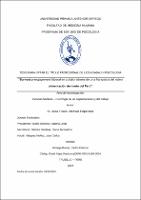Burnout y engagement laboral en colaboradores de una franquicia del rubro alimentación del norte del Perú

Fecha
2023Autor(es)
Arias Torres, Stefhani Emperatriz
Metadatos
Mostrar el registro completo del ítemResumen
Objetivo: El objetivo de este estudio fue establecer la relación entre burnout y engagement laboral en colaboradores de una franquicia del rubro alimentación del norte del Perú.
Materiales y métodos: Se realizó un estudio de tipo sustantivo, su diseño de investigación fue descriptivo-correlacional. Participaron 103 colaboradores, varones y mujeres. Se trabajó con el Cuestionario para la evaluación del síndrome de quemarse por el trabajo-CESQT de Pedro R. Gil-Monte (2011) y la Escala Utrecht de engagement en el trabajo-UWES de Wilmar Schaufeli y Arnold Bakker (2003).
Resultados: Se obtuvo como resultado 31.1% de nivel medio en burnout y 48.5% de nivel promedio en engagement laboral. Además, se encontró una correlación altamente significativa (p<.01) inversa entre ambas variables. También se halló correlación altamente significativa (p<.01) directa entre la dimensión ilusión por el trabajo de burnout y las dimensiones de engagement laboral, así como correlación altamente significativa (p<.01) inversa entre las dimensiones desgaste psíquico, indolencia y culpa de burnout y las dimensiones de engagement laboral Objective: The objective of this study was to establish the relationship between burnout and work engagement in employees of a food franchise in northern Peru.
Materials and methods: A substantive study was carried out; its research design was descriptive-correlational. 103 collaborators, men and women, participated. We worked with the Questionnaire for the evaluation of burnout syndrome-CESQT by Pedro R. Gil-Monte (2011) and the Utrecht Work Commitment Scale-UWES by Wilmar Schaufeli and Arnold Bakker (2003).
Results: The result was an average level of 31.1% in burnout and an average level of 48.5% in work engagement. Furthermore, a highly significant inverse correlation (p<0.01) was found between both variables. A highly significant direct correlation (p<.01) was also found between the enthusiasm for work dimension of burnout and the dimensions of work engagement, as well as a highly significant inverse correlation (p<.01) between the dimensions of psychological well-being, exhaustion, indolence and guilt for burnout and the dimensions of work engagement
Palabras clave
Colecciones
- Psicología [613]

